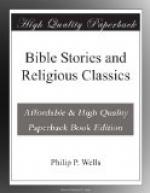While this melancholy change had taken place in Ilbrahim, one of an earlier origin and of different character had come to its perfection in his adopted father. The incident with which this tale commences found Pearson in a state of religious dulness, yet mentally disquieted, and longing for a more fervid faith than he possessed. The first effect of his kindness to Ilbrahim was to produce a softened feeling, and incipient love for the child’s whole sect; but joined to this, and resulting perhaps from self-suspicion, was a proud and ostentatious contempt of their tenets and practical extravagances. In the course of much thought, however, for the subject struggled irresistibly into his mind, the foolishness of the doctrine began to be less evident, and the points which had particularly offended his reason assumed another aspect, or vanished entirely away. The work within him appeared to go on even while he slept, and that which had been a doubt, when he laid down to rest, would often hold the place of a truth, confirmed by some forgotten demonstration, when he recalled his thoughts in the morning. But while he was thus becoming assimilated to the enthusiasts, his contempt, in no wise decreasing toward them, grew very fierce against himself; he imagined, also, that every face of his acquaintance wore a sneer, and that every word addressed to him was a gibe. Such was his state of mind at the period of Ilbrahim’s misfortune; and the emotions consequent upon that event completed the change, of which the child had been the original instrument.
In the meantime, neither the fierceness of the persecutors, nor the infatuation of their victims, had decreased. The dungeons were never empty; the streets of almost every village echoed daily with a lash; the life of a woman, whose mild and Christian spirit no cruelty could imbitter, had been sacrificed; and more innocent blood was yet to pollute the hands that were so often raised in prayer. Early after the Restoration, the English Quakers represented to Charles II. that a “vein of blood was open in his dominions”; but though the displeasure of the voluptuous king was roused, his interference was not prompt. And now the tale must stride forward over many months, leaving Pearson to encounter ignominy and misfortune; his wife to a firm endurance of a thousand sorrows; poor Ilbrahim to pine and droop like a cankered rosebud; his mother to wander on a mistaken errand, neglectful of the holiest trust which can be committed to a woman.




